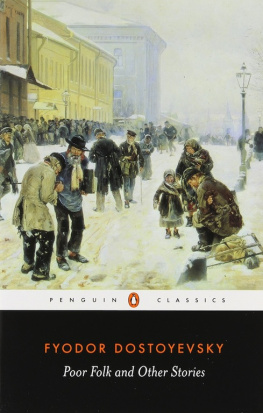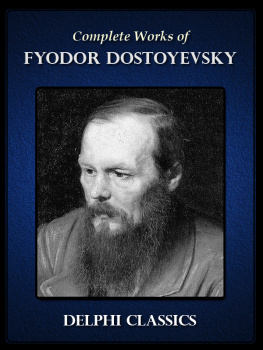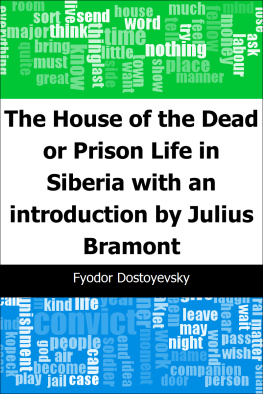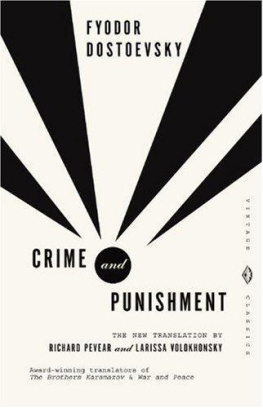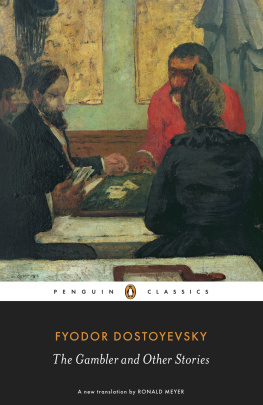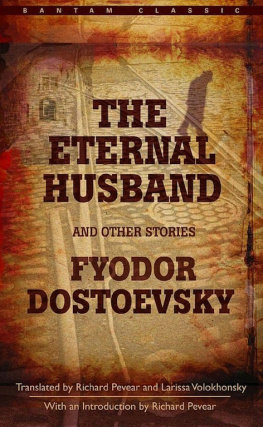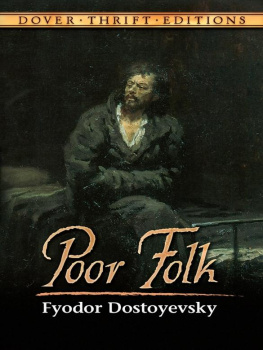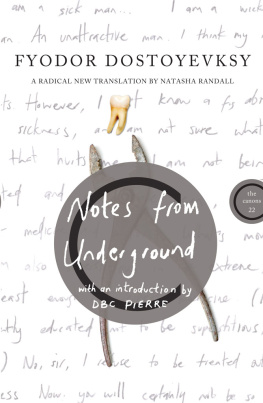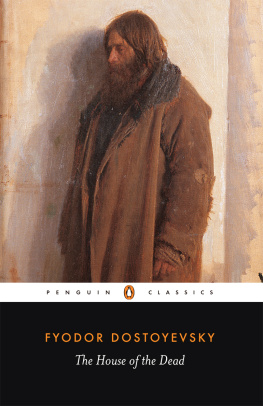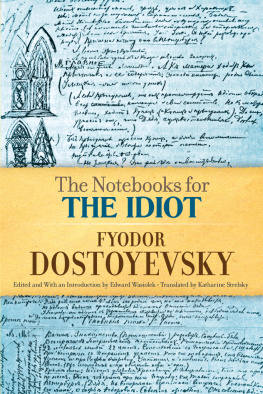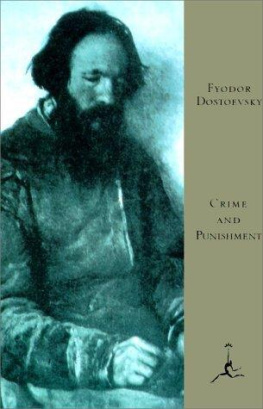Fyodor Dostoyevsky - Poor Folk and Other Stories
Here you can read online Fyodor Dostoyevsky - Poor Folk and Other Stories full text of the book (entire story) in english for free. Download pdf and epub, get meaning, cover and reviews about this ebook. year: 1988, publisher: Penguin Books Ltd, genre: Science. Description of the work, (preface) as well as reviews are available. Best literature library LitArk.com created for fans of good reading and offers a wide selection of genres:
Romance novel
Science fiction
Adventure
Detective
Science
History
Home and family
Prose
Art
Politics
Computer
Non-fiction
Religion
Business
Children
Humor
Choose a favorite category and find really read worthwhile books. Enjoy immersion in the world of imagination, feel the emotions of the characters or learn something new for yourself, make an fascinating discovery.
- Book:Poor Folk and Other Stories
- Author:
- Publisher:Penguin Books Ltd
- Genre:
- Year:1988
- Rating:4 / 5
- Favourites:Add to favourites
- Your mark:
- 80
- 1
- 2
- 3
- 4
- 5
Poor Folk and Other Stories: summary, description and annotation
We offer to read an annotation, description, summary or preface (depends on what the author of the book "Poor Folk and Other Stories" wrote himself). If you haven't found the necessary information about the book — write in the comments, we will try to find it.
Poor Folk and Other Stories — read online for free the complete book (whole text) full work
Below is the text of the book, divided by pages. System saving the place of the last page read, allows you to conveniently read the book "Poor Folk and Other Stories" online for free, without having to search again every time where you left off. Put a bookmark, and you can go to the page where you finished reading at any time.
Font size:
Interval:
Bookmark:

POOR FOLK AND OTHER STORIES
FYODOR MIKHAILOVICH DOSTOYEVSKY was born in Moscow in 1821, the second of a physicians seven children. His mother died in 1837 and his father was murdered a little over two years later. When he left his private boarding school in Moscow he studied from 1838 to 1843 at the Military Engineering College in St Petersburg, graduating with officers rank. His first story to be published, Poor Folk (1846), was a great success. In 1849 he was arrested and sentenced to death for participating in the Petrashevsky circle; he was reprieved at the last moment but sentenced to penal servitude, and until 1854 he lived in a convict prison at Omsk, Siberia. In the decade following his return from exile he wrote The Village of Stepanchikovo (1859) and The House of the Dead (1860). Whereas the latter draws heavily on his experiences in prison, the former inhabits a completely different world, shot through with comedy and satire. In 1861 he began the review Vremya (Time) with his brother; in 1862 and 1863 he went abroad, where he strengthened his anti-European outlook, met Mlle Suslova, who was the model for many of his heroines, and gave way to his passion for gambling. In the following years he fell deeply in debt, but in 1867 he married Anna Grigoryevna Snitkina (his second wife), who helped to rescue him from his financial morass. They lived abroad for four years, then in 1873 he was invited to edit Grazhdanin (The Citizen), to which he contributed his Diary of a Writer. From 1876 the latter was issued separately and had a large circulation. In 1880 he delivered his famous address at the unveiling of Pushkins memorial in Moscow; he died six months later in 1881. Most of his important works were written after 1864: Notes from Underground (1864), Crime and Punishment (1865-6), The Gambler (1866), The idiot (1869), The Devils (1871) and The Brothers Karamazov (1880).
DAVID MCDUFF was born in 1945 and was educated at the University of Edinburgh. His publications comprise a large number of translations of foreign verse and prose, including poems by Joseph Brodsky and Tomas Venclova, as well as contemporary Scandinavian work; Selected Poems of Osip Mandelstam; Complete Poems of Edith Sdergran; and No Im Not Afraid, the selected poems of Irina Ratushinskaya. His first book of verse, Words inNature, appeared in 1972. He has translated a number of nineteenth-century Russian prose works for the Penguin Classics series. These include Dostoyevskys The Brothers Karamazov, Crime and Punishment, The House of the Dead, Poor Folk and Other Stories and Uncles Dream and Other Stories, Tolstoys The Kreutzer Sonata and Other Stories and The Sebastopol Sketches, and Nikolai Leskovs Lady Macbeth of Mtsensk. He has also translated Babels Collected Stories and Belys Petersburg for Penguin.
FYODOR DOSTOYEVSKY

TRANSLATED WITH AN INTRODUCTION
AND NOTES BY
DAVID MCDUFF
PENGUIN BOOKS
PENGUIN BOOKS
Published by the Penguin Group
Penguin Books Ltd, 80 Strand, London WC2R 0RL, England
Penguin Putnam Inc., 375 Hudson Street, New York, New York 10014, USA
Penguin Books Australia Ltd, 250 Camberwell Road, Camberwell, Victoria 3124, Australia
Penguin Books Canada Ltd, 10 Alcorn Avenue, Toronto, Ontario, Canada M4V 3B2
Penguin Books India (P) Ltd, 11 Community Centre, Panchsheel Park, New Delhi 110 017, India
Penguin Books (NZ) Ltd, Cnr Rosedale and Airborne Roads, Albany, Auckland, New Zealand
Penguin Books (South Africa)(Pty) Ltd, 24 Sturdee Avenue, Rosebank 2196, South Africa
Penguin Books Ltd, Registered Offices: 80 Strand, London WC2R 0RL, England
www.penguin.com
This translation first published 1988
18
Translation, Introduction and Notes copyright David Mc Duff, 1988
All rights reserved
Except in the United States of America, this book is sold subject
to the condition that it shall not, by way of trade or otherwise, be lent,
re-sold, hired out, or otherwise circulated without the publishers
prior consent in any form of binding or cover other than that in
which it is published and without a similar condition including this
condition being imposed on the subsequent purchaser
EISBN: 9780141907826


Dostoyevsky began his literary career as a translator of French fiction and the author of some plays inspired by his reading of Schiller. As an army sublieutenant in his early twenties attempting to finance a somewhat extravagant lifestyle on a budget consisting of his army salary and the not inconsiderable allowance he received from Karepin, the trustee of his fathers estate, of 5,000 paper rubles per annum (a paper ruble was roughly equivalent in value to one third of a silver ruble), he turned increasingly to literary activity in the hope of combining his recently acquired idealistic philosophical convictions with his desire for fame and fortune. Of the plays, we know only that he wrote a pair of dramas, begun around 1841, entitled Maria Stuart and Boris Godunov, and a Shakespearean play modelled on The Merchant of Venice called The Jew Yankel the titles are all that has survived of them. We have rather more information about his activity as a translator. Like the theatre, French novels were extremely popular in the St Petersburg of the 1830s and 40s. The writings of Balzac, Sue and Hugo exercised a huge fascination on the Russian educated reading public. When Balzac visited St Petersburg for three months in 1843 he was greeted with universal acclaim as a literary hero. One of Dostoyevskys early major translation projects was a complete Russian version of Balzacs novel Eugnie Grandet. Dostoyevskys biographer Konstantin Mochulsky writes of this:
the translator intensified the emotional tone of the novel and did not hesitate
Balzacs influence on Dostoyevsky was profound and far-reaching. It would not be too much of an exaggeration to say that, without it, he might never have developed his creative talent in the direction he ultimately chose. In the character of Pre Goriot, for example, Dostoyevsky found the antecedent for a whole range of his own insulted and injured civil servants, while Rastignac is in many senses a forerunner of Raskolnikov. It was while he was working on his translation of Eugnie Grandet that Dostoyevksy conceived the idea for a novel of his own, of roughly the same length. In reply to his brother Mikhail, who was urging him to consider a career in the theatre as a playwright, and with whom he was planning a translation of Schillers plays, he objected that he needed money right away, and the rehearsal and performance of plays took time. I have a hope, he wrote to Mikhail on 30 September 1844.
I am finishing a novel of the same dimensions as Eugnie Grandet. Its rather an original piece of work. Im at present copying it out, and I shall probably have had a reply concerning it by the 14th. Im going to send it to Notes of the Fatherland. (Im satisfied with my work.) I may get 400 rubles for it, and therein lie all my hopes.
The first draft of the novel,
Font size:
Interval:
Bookmark:
Similar books «Poor Folk and Other Stories»
Look at similar books to Poor Folk and Other Stories. We have selected literature similar in name and meaning in the hope of providing readers with more options to find new, interesting, not yet read works.
Discussion, reviews of the book Poor Folk and Other Stories and just readers' own opinions. Leave your comments, write what you think about the work, its meaning or the main characters. Specify what exactly you liked and what you didn't like, and why you think so.

